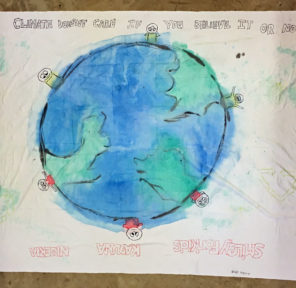
About this Parachute
Story
Some communities in my state which is Kaduna State located in the northern part of Nigeria, are faced with poor sanitary condition which is a huge concern. This has led to lack of access to safe and clean water. Due to some practices/activities, households produce large volume of waste which has contributed a lot of pollution, blockage of drainages, breeding grounds for mosquitoes thereby increasing the outbreak of malaria. The waste generated and its improper disposal has led to cholera outbreak in some areas and other environmental diseases. Also waste disposal sites are not properly located or constructed. Some of these waste sites are always close to houses, water bodies, markets, schools e.t.c and this increases the spread of diseases should there be any outbreak. Some are these communities use firewood for cooking of which felling of trees for such purpose contributes to deforestation and erosion. The smoke from the fire wood when cooking contributes to air pollution. Also use of non- energy saving bulbs and lanterns to augment poor power supply which we know in turn negatively impact the climate and environment at large. Most communities especially the urban-slum areas here are faced with poor drainage system, which is either poorly constructed, no drainages or blocked drainages. Most of the blocked drainages are as a result of volume of waste generated, improper waste disposal, poor housing system, lack of proper water channels etc The housing pattern in urban-slum communities are not well distributed and these areas lack green areas where nature can be appreciated due to high population density and felling of trees for development and as fuel for cooking. All these activities contribute to greenhouse gasses and thereby leading to climate change. There is also the issue of drought which is a big challenge caused by decline in annual rainfall compared to previous years and this makes the community experience poor crop yield and drying of wells which in some part is the major source of water. As a result poverty level is on the increase at an alarming rate.
Sustainable Actions in this Community
We developed action plan for community engagement by bringing communities together to create conversations with a common purpose of fighting climate change, and overtime build resilience. This will help demand ownership by the communities involved, and most importantly build a culture where local people remain united towards fighting climate change. We introduce activities that integrate a holistic approach to climate change by addressing livelihood of communities, adaptation, mitigation, and sustainable development. Our approach is to tackle climate change at grass root level by building a model for community mobilization and development in which local people take deliberate actions towards ensuring successful climate action projects. We introduced an intervention project called Community action for climate change (CACC) which seeks to improve the engagement of local communities towards reducing their vulnerability to climate change by organizing clean-up exercise, waste management especially sorting of waste and recycling through grass root education and advocacy. So far, over 400 trees have been planted in Kaduna State through engaging with 5 schools in 3 communities. With an increasing year of experience in engaging communities at the grass root, we are uniquely positioned to further offer an integrated response to climate change through the initiative. We also engage with community leaders/members to promote alternative livelihood practices e.g use of renewable energy source of energy to augment poor power supply and the use of conventional source of electricity. We also introduce durable energy saving bulbs and cooking stoves. Organize Educational programs for primary and secondary school children to create awareness and participation in environmental protection.
